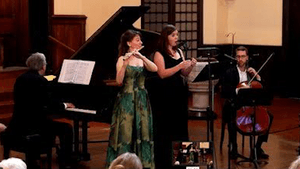Sweet sounds, sweet life
Dolce Suono Ensemble Goes to the Opera

It was a Sunday afternoon in September, and I was sitting in a room where musicians were making music, surrounded by people who like to sit in rooms where musicians are making music.
That’s the way I spend most of my Sunday afternoons from September through May and it’s one of the primary reasons I live in the center of Philadelphia. On September 25th the musicians were soprano Sarah Shafer and three instrumentalists from Mimi Stillman’s Dolce Suono Ensemble. They played eight pieces associated with operas: five arias and three instrumental works.
A perfect balance
Sarah Shafer is a rare example of a young vocalist who can combine a budding opera career with perfectly realized chamber performances. She hit some big notes when her scores called for it but she never sounded like she was trying to bring down the house at La Scala.
One of the major pleasures of the afternoon was the way Shafer’s voice blended with three expertly balanced instruments. The program opened with Charles Abramovic introducing a Bach aria with a mood-setting, carefully subdued organ accompaniment. (The Bach being an aria from the St. Matthew Passion, a very operatic oratorio). When Mimi Stillman’s flute obbligato reentered at one point, there was a moment when it sounded like a second human voice had joined the ensemble.
As Stillman noted, this was the first concert in which Dolce Suono presented the famous “Dolce Suono” aria from Donizetti’s Lucia di Lammermoor. There is no connection between the Dolce Suono Ensemble’s name (which means sweet sounds) and the revenge aria sung by a madwoman who has just murdered her bridegroom.
A pretty night
Schafer’s other arias were less melodramatic. “Casta Diva” from Bellini’s Norma is a serene pagan prayer for peace addressed to the moon goddess. “Ain’t It a Pretty Night,” from Carlisle Floyd’s Susannah, presented a touching portrait of a young woman’s aspirations.
The “Flower Duet” from Léo Delibes Lakmé normally requires two vocalists. In this version, Stillman played the mezzo part on the flute and she and Shafer exited making music, as they would in the opera.
Carl Maria von Weber’s G Minor Trio for flute, cello, and piano made the program because it reflects the composer’s opera style. It’s packed with melodies and it keeps evoking scenes like the village waltz and the oompah marching band suggested in the scherzo.
The other two instrumental pieces drew their material directly from operas. François Borne’s fantasy on themes from Carmen packs most of the feel of the opera into a piece for flute and piano. Stillman played Carmen’s melodies with the understated flair she puts into her tango performances, but Borne didn’t restrict the flute to the title role.
“The flute part contains themes sung by all of the major characters in the opera,” Stillman wrote in her notes on the program. “Carmen, Micaela, Don José, and Escamillo. I get to play all the roles!”
Much-needed gentling
Cellist Nathan Vickery got his biggest turn in the spotlight in a duo for piano and cello based on themes from Meyerbeer’s opera Robert Le Diable. Chopin composed the piece in collaboration with a cello virtuoso, his friend Auguste Franchomme. Chopin wrote the piano part and planned the overall form; Franchomme wrote the cello part.
The result of this collaboration might not satisfy those who demand rigorously constructed scores, but it’s a wonderfully enjoyable showcase for both instruments. It’s the kind of piece that has the cellist sawing like mad one moment and drawing out a line the next.
Our ancestors used to argue that liberal education “gentled” people. The older I get, the more I’m inclined to agree with them. If you love the arts and the sciences, you will never be bored and your feelings about your species will be softened by regular contacts with civilized people peaceably enjoying themselves.
What, When, Where
Dolce Suono Ensemble Goes to the Opera. Bach, “Aus Liebe will mein Heiland sterben." Weber, Trio in G Minor. Bellini, “Casta Diva." Chopin/Franchomme, Grand Duo Concertant in E Major. Floyd, “Ain’t It a Pretty Night." Donizetti, “Il dolce suono." Borne, Fantasie Brilliante on Themes from Bizet’s Carmen. Delibes, “Sous le dôme épais” ("Flower Duet") from Lakmé. Sarah Shafer, soprano. Mimi Stillman, flute. Nathan Vickery, cello. Charles Abramovic, piano/organ. Sept. 25, 2016 at the Trinity Center for Urban Life, 22nd and Spruce Sts., Philadelphia. (267) 252-1803 or dolcesuono.com.
Sign up for our newsletter
All of the week's new articles, all in one place. Sign up for the free weekly BSR newsletters, and don't miss a conversation.

 Tom Purdom
Tom Purdom